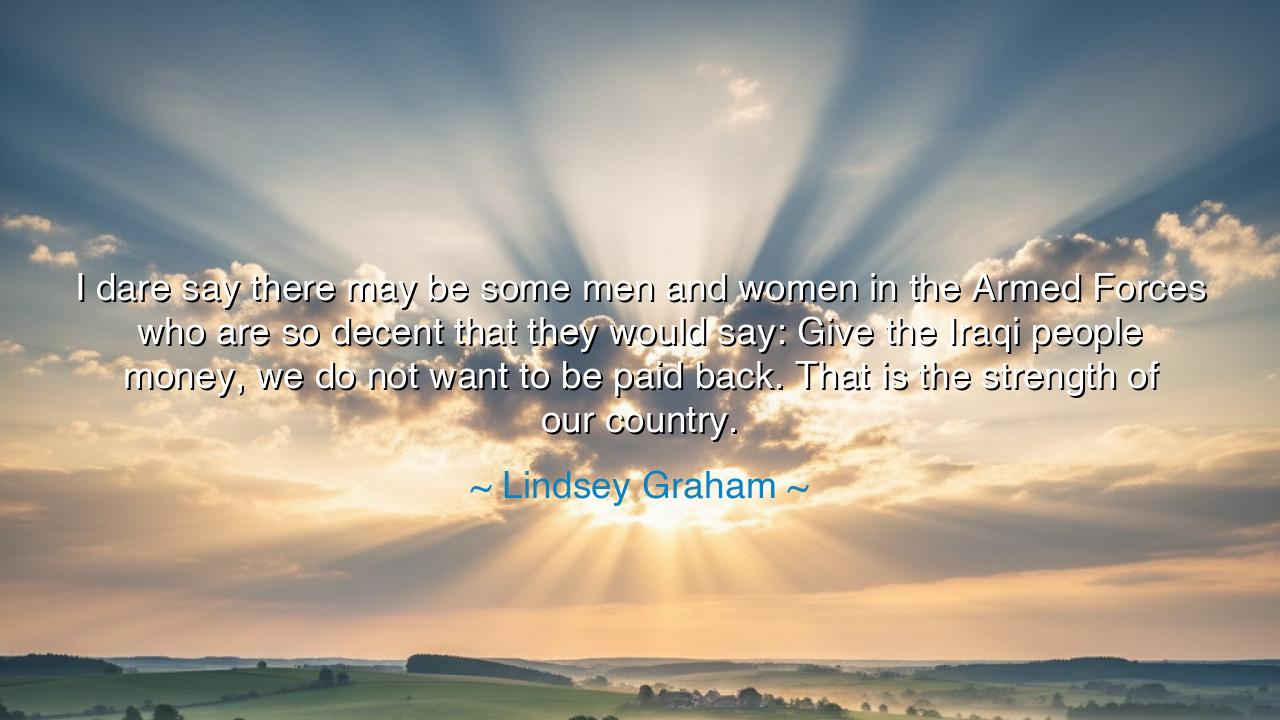
I dare say there may be some men and women in the Armed Forces
I dare say there may be some men and women in the Armed Forces who are so decent that they would say: Give the Iraqi people money, we do not want to be paid back. That is the strength of our country.






Hear, O children of remembrance, the words of Lindsey Graham, who in the midst of war spoke of a deeper truth: “I dare say there may be some men and women in the Armed Forces who are so decent that they would say: Give the Iraqi people money, we do not want to be paid back. That is the strength of our country.” These words are not merely about gold or payment, but about the spirit of sacrifice, of decency, and of the unseen strength that lies in compassion rather than conquest. For the true power of a nation is not measured only in arms or in wealth, but in the generosity of its people when they give without expecting return.
The context of this saying was the long and bitter war in Iraq, a conflict of blood and fire. Yet even in such times, when the drums of war drown the voices of peace, Graham reminded his listeners that the heart of America was not only in its weapons, but in its soldiers’ decency. Men and women who bore arms also bore compassion, who knew that the greatness of a country is not in what it takes, but in what it gives. To imagine soldiers saying, “We do not wish to be paid back,” is to glimpse the soul of a nation willing to sow hope rather than harvest debt.
This is no new truth. History speaks with many voices of such unselfish giving. Consider the Marshall Plan after the Second World War, when the United States poured billions into Europe, not demanding repayment, but seeking to rebuild lands ravaged by war. From the ashes of Germany and France, from the ruins of Italy and beyond, a continent was reborn. The strength of a nation was revealed not only in victory on the battlefield, but in generosity after the guns had fallen silent. What Graham spoke of in Iraq was an echo of this same spirit—that to give freely, without repayment, is the highest form of strength.
And yet, O listeners, do not mistake such generosity for weakness. For to give without expecting return requires more courage than to demand. It requires the power to look beyond one’s own need, to believe that investing in the well-being of another enriches both giver and receiver. When soldiers extend such decency, when nations extend such gifts, they do not diminish themselves—they prove their greatness. The hand that heals is always stronger than the hand that strikes.
But the saying also speaks to us not only as nations, but as individuals. How many times do we give only when repayment is assured? How often do we measure kindness like merchants weigh coin? Yet the teaching is clear: to give freely, to pour out generosity without thought of return, is the true strength of character. The soldier who gives without asking back, the neighbor who helps without reward, the friend who loves without condition—these embody the noblest spirit of humanity.
Therefore, let this lesson sink deep: the strength of your life will not be measured by how much you have stored, but by how much you have given away. If you would live greatly, learn to give generously—not only of coin, but of time, of mercy, of patience, of love. The world is healed not by bargains, but by gifts. Let your strength be found in your decency, as Graham praised, and you will leave behind not debts, but legacies.
Practical is this counsel: give something each day without seeking return. It may be a word of encouragement, an act of service, a listening ear, or a gift to one in need. Let your giving be like the river that flows freely, refreshing all it touches. For in this way, you live the truth of Graham’s words—you reveal the strength of a country, and of a soul, that measures its greatness not by wealth gained, but by hope shared.
Thus remember: “Give… we do not want to be paid back. That is the strength of our country.” Let these words be not only for nations, but for hearts. For the true strength of any people, and of any life, is found in the power to give without condition, and to love without price.






AAdministratorAdministrator
Welcome, honored guests. Please leave a comment, we will respond soon